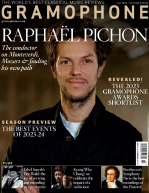Texte paru dans: / Appeared in: |
|
 |
Outil de traduction |
|
I have long enjoyed Bojan Čičić's exploration of lesserknown Baroque composers on Delphian such as Johann Jakob Walther (10/22), so it comes as no surprise that he has been working towards this splendid recording of Bach’s Sonatas and Partitas for violin without bass; cornerstone repertoire with an impressive context. There is also a moving story behind this release: inspired by guitarist Sean Shibe’s Gramophone Award-winning Bach album of 2020, Čičić also recorded in Scotland’s 15th-century Crichton Collegiate Church just as lockdowns were easing, and this venue makes a considerable contribution to the atmosphere of the disc. Furthermore, Čičić dedicates this album to his teacher from Zagreb, Damir Kukulj, who died recently.
The Partitas are presented first, then the Sonatas, and there is a superb note on the music from harpsichordist Mahan Esfahani. Čičić’s tone balances a sensuous grain with occasional naivety, making an interesting contrast to Rachel Podger’s sweeter, more singing tone (Channel Classics, 7/99). Čičić plays a 1701 violin by G Tononi of Bologna and it’s apparent from the start that he can command attention in the austere slower movements such as the opening Allemande of the First Partita, which has space, light and gravitas. Having said that, I also heard what my colleague Mark Seow once called Čičić’s ‘boyish nonchalance’ (10/22) in some of the most technically challenging passages. A good example of this is the Allemande’s Double, which is so pinpoint accurate that it can feel a little pointillistic at times.
In the great D minor Partita I loved the bounce of C?i?ic´’s Corrente and especially his dazzling Giga, but the Ciaccona is slightly too conservative for my tastes. I still after all these years listen to Christoph Poppen’s demonstrative account, which vividly demonstrates the theory that this may have been a tombeau for Bach’s first wife (ECM, 11/01). That said, C?i?ic´’s arpeggiated passages are simply stunning; I’m not sure I breathed between bars 90 and 120.
The Sonatas benefit most from C?i?ic´’s uncluttered style. The spacious opening to the G minor Adagio is delicious, as is the technical clarity of the Presto, which adds a little more verve with each repeat. On the whole I found the fugues finely etched, but in the A minor Sonata I was surprised to find the pace a good few notches slower than Podger. In particular I would have liked more momentum on repeated notes such as the recurring A around bar 45, which acts as a springboard into the next section. Rather, C?i?ic´ takes a careful, almost melancholic approach, which suits his tone and venue well, but I want a little bit more dance or drama at every opportunity.
This is a wonderful addition to a strong field of baroque performances, technically assured and deeply considered. It’s a gentle, introspective album: for me it will be the perfect Sonatas and Partitas for the small hours. |
|




